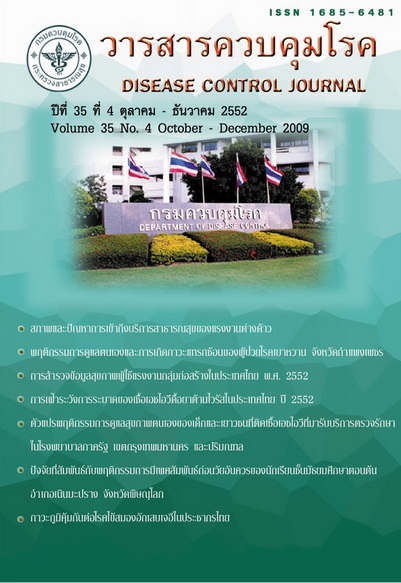Health Data Survey of Construction Workers in Thailand in 2009
Keywords:
Health behavior, construction workerAbstract
Construction workers were large group of workers, estimated of more than 1 million in Thailand, but health data were still limited. This cross sectional survey study aimed to gather general health information of this group of workers to improve health and safety care plans in the future. We surveyed 96 workers who worked in Nakorn Pathom, Songkla, Kon Kean and Rayong provinces. We found 83.3% of construction workers were male, 69.4% were graduated from primary schools low incomes and worked as informal workers. Their average age was 43.4 years. Their average working time was 12.9 years. Their health profiles were not well, high rates of alcoholic consumption and tobacco smoking (77.1 and 66.7% respectively). They exposed to various kind of occupational hazards, high rates of stress, high rates of work-related illness and injury. We concluded that it was important for health and labor organizations to increase concern about health problems of construction workers.
Downloads
References
2. Felton JS. The construction industry: Its occupational health and safety experience and needs. In: McCunney RJ, ed. A practical approach to occupational and environmental medicine. 3rd ed. PA: Lippincott Williams & Wilkins 2003:
662 - 89.
3. Weeks JL. Health and safety hazards in the construction industry. In: Stellman JM, ed. ILO Encyclopaedia of Occupational Health and Safety. 4th ed. Geneva: International Labour Office 1998.
4. สำนักงานสถิติแห่งชาติ. การสำรวจอุตสาหกรรมก่อสร้าง พ.ศ. 2547. 2547 [เข้าถึงเมื่อ 28 กันยายน 2552]; แหล่งที่มา: http://service. nso.go.th/nso/nsopublish/service/const47_ind/construct.pdf
5. สำนักงานสถิติแห่งชาติ. รายงานการสำรวจแรงงานนอกระบบ พ.ศ. 2551. 2551 [เข้าถึงเมื่อ 28 กันยายน 2552]; แหล่งที่มา: http://service.nso.go.th/nso/nsopublish/service/ survey/laborOutExc51.pdf
6. Snashall D. Occupational health in the construction industry. Scand J Work Environ Health. 2005; 31 Suppl 2: 5-10.
7. กองวิจัยและพัฒนา สำนักงานประกันสังคม กระทรวงแรงงาน. สถิติงานประกันสังคม พ.ศ. 2551. นนทบุรี: สำนักงานประกันสังคม 2551.
8. ศิริชัย มุ่งวิริยะ. การศึกษาสภาพและความต้องการของคนงานก่อสร้างในงานก่อสร้างประเภทอาคารสูง เขตกรุงเทพมหานคร. กรุงเทพมหานคร: สำนักงานคณะกรรมการข้าราชการพลเรือน (ก.พ.); 2542.
9. มนตรี นามมงคล, ปริทรรศ ศิลปกิจ, ลัดดาวัลย์ พิบูลย์ศรี, สุนทรี สุริยา. ผลกระทบของการย้ายถิ่นต่อสุขภาพจิตแรงงานก่อสร้าง. เชียงใหม่: โรงพยาบาลสวนปรุง กรมสุขภาพจิต กระทรวงสาธารณสุข; 2537.
10. พรรคริน ลังกาพินธุ์. การดูแลสุขภาพอนามัยของตนเองในผู้ใช้แรงงานก่อสร้างศึกษาเฉพาะกรณี: ผู้ใช้แรงงานก่อสร้างที่มารับบริการจากงานสังคมสงเคราะห์ โรงพยาบาลราชวิถี [วิทยานิพนธ์สังคมสงเคราะห์ศาสตร์ มหาบัณฑิต]. ปทุมธานี: มหาวิทยาลัยธรรมศาสตร์; 2540.
11. กลุ่มงานอาชีวอนามัยในแรงงานนอกระบบ สำนักโรคจากการประกอบอาชีพและสิ่งแวดล้อม. แนวทางการดำเนินงานประเมินความเสี่ยงต่อสุขภาพในการทำงานของกลุ่มแรงงานนอกระบบ. นนทบุรี: สำนักโรคจากการประกอบอาชีพและสิ่งแวดล้อม กรมควบคุมโรค กระทรวงสาธารณสุข 2552.
12. กระทรวงแรงงาน. อัตราค่าจ้างขั้นต่ำ 1 มิถุนายน พ.ศ. 2551. 2551 [เข้าถึงเมื่อ 1 ธันวาคม 2552]; แหล่งที่มา: http://www.mol.go.th/statistic_01.html
13. Roto P. Preventive health services in construction. In: Stellman JM, ed. ILO Encyclopaedia of Occupational Health and Safety. 4th ed. Geneva: International Labour Office 1998.
14.สมาคมอุตสาหกรรมก่อสร้างไทย. ข่าวทั่วไป - ถกหอการค้าจี้รัฐแก้แรงงานปี 52 เร่งกระทรวงขึ้นทะเบียนแรงงานต่างด้าว. 2552 [เข้าถึงเมื่อ 30 พฤศจิกายน 2552]; แหล่งที่มา: http://www.tca.or.th/html/news_detail.asp?Lang=&id=3097 &category_id=1
15. International Agency for Research on Cancer (IARC). IARC Monographs on the evaluation of carcinogenic risks to humans Vol.62, Wood dust and formaldehyde. Lyon 1995.
16. Nieuwenhuijsen MJ. Exposure assessment in occupational and environmental epidemiology. Oxford: Oxford university press 2003.
17. Dong X. Long workhours, work scheduling and work-related injuries among construction workers in the United States. Scand J Work Environ Health. 2005 Oct; 31(5): 329-35.
18. Hartmann B, Fleischer AG. Physical load exposure at construction sites. Scand J Work Environ Health. 2005; 31 Suppl 2: 88-95.
19. Li CY, Sung FC. A review of the healthy worker effect in occupational epidemiology. Occup Med (Lond). 1999 May; 49(4): 225-9.
20. Dannenberg AL, Parver LM, Brechner RJ, Khoo L. Penetration eye injuries in the workplace. The National Eye Trauma System Registry. Arch Ophthalmol. 1992 Jun; 110(6): 843-8.
21. Blais BR. Basic principles of occupational ophthalmology. In: Tasman W, Jaeger EA, eds. Duane's Ophthalmology. MD: Lippincott Williams & Wilkins 2006.
Downloads
Published
How to Cite
Issue
Section
License
Articles published in the Disease Control Journal are considered as academic work, research or analysis of the personal opinion of the authors, not the opinion of the Thailand Department of Disease Control or editorial team. The authors must be responsible for their articles.






